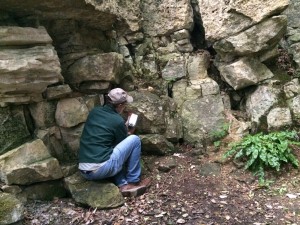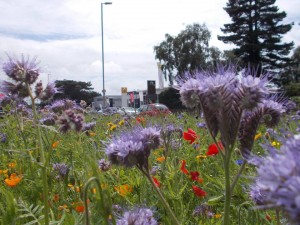The Building Roman Britain project is investigating the source of stone and ceramic materials (e.g. bricks, tiles, flues, etc.) from key sites in Roman Britain. Using Roman Bath and Fishbourne Roman Palace as our main sites, we have been using x-ray floresence (XRF) to profile these materials and to look for patterns in their production, distribution and use. Funded by HEIF 5+1, the current phase of work will soon be concluded, although it is hoped to carry on with our partners over the coming year, producing joint publications as well as museum displays and interactives.

Analysing a quarry near Bath
We have now completed over 2400 analyses, a full GIS plan of the Fishbourne ‘92 excavations, and numerous visits to both Bath and Fishbourne to undertake in situ analysis, using a portable XRF device. The team was ably assisted in this work by the appointment of an URA, Dominique Druce, who is now planning her dissertation around a related pXRF study.
In early April the team presented a paper at the Computer Applications and Quantitative Methods in Archaeology (CAA) conference in Oslo that focused on the analysis of ceramic building material and presented some interesting interim results. The paper was well received and the methods and approaches outlined stimulated some very useful discussion.
With an ever increasing mass of data it was decided to begin processing and interpreting the data alongside some lab-based analysis, with the aim of identifying the most promising areas on which to focus our final investigations. However, we still found time to visit Fishbourne and examine some of the in-situ mosaics. Meanwhile, the preliminary examination of data drove a renewed focus on exploring quarry sites in the Bath area and we have since returned to the quarries at Brown’s Folly near Bath to conduct intensive, quarry-face analyses.
As an offshoot from the project, Derek Pitman (the project’s RA) took the pXRF kit to the Purbeck School’s science fair along with members of BU’s STEM outreach team, where he was able to show how scientific methods help archaeologists understand ancient materials. Continuing with the public understanding of science theme, we are now working with our partners at Bath and Fishbourne Museums to develop new, innovative display methods for our results that will include the use of video and digital media to communicate project results and STEM to a wider audience.
While the summer of 2016 sees our HEIF 5+1 funding coming to an end, the Building Roman Britain team will carry on into 2017 in order to help bring the HEIF phase of the project to publication and to build the next phase of further investigations into Roman building materials. This includes our project’s inclusion in a multi-million pound bid to the HLF for redisplay work at Roman Bath Museum as part of their Archway Project. For further details, see our research project page.











 REF
REF Research funding
Research funding NCUB
NCUB










 Expand Your Impact: Collaboration and Networking Workshops for Researchers
Expand Your Impact: Collaboration and Networking Workshops for Researchers Visiting Prof. Sujan Marahatta presenting at BU
Visiting Prof. Sujan Marahatta presenting at BU 3C Event: Research Culture, Community & Can you Guess Who? Thursday 26 March 1-2pm
3C Event: Research Culture, Community & Can you Guess Who? Thursday 26 March 1-2pm UKCGE Recognised Research Supervision Programme: Deadline Approaching
UKCGE Recognised Research Supervision Programme: Deadline Approaching ECR Funding Open Call: Research Culture & Community Grant – Apply now
ECR Funding Open Call: Research Culture & Community Grant – Apply now ECR Funding Open Call: Research Culture & Community Grant – Application Deadline Friday 12 December
ECR Funding Open Call: Research Culture & Community Grant – Application Deadline Friday 12 December MSCA Postdoctoral Fellowships 2025 Call
MSCA Postdoctoral Fellowships 2025 Call ERC Advanced Grant 2025 Webinar
ERC Advanced Grant 2025 Webinar Update on UKRO services
Update on UKRO services European research project exploring use of ‘virtual twins’ to better manage metabolic associated fatty liver disease
European research project exploring use of ‘virtual twins’ to better manage metabolic associated fatty liver disease